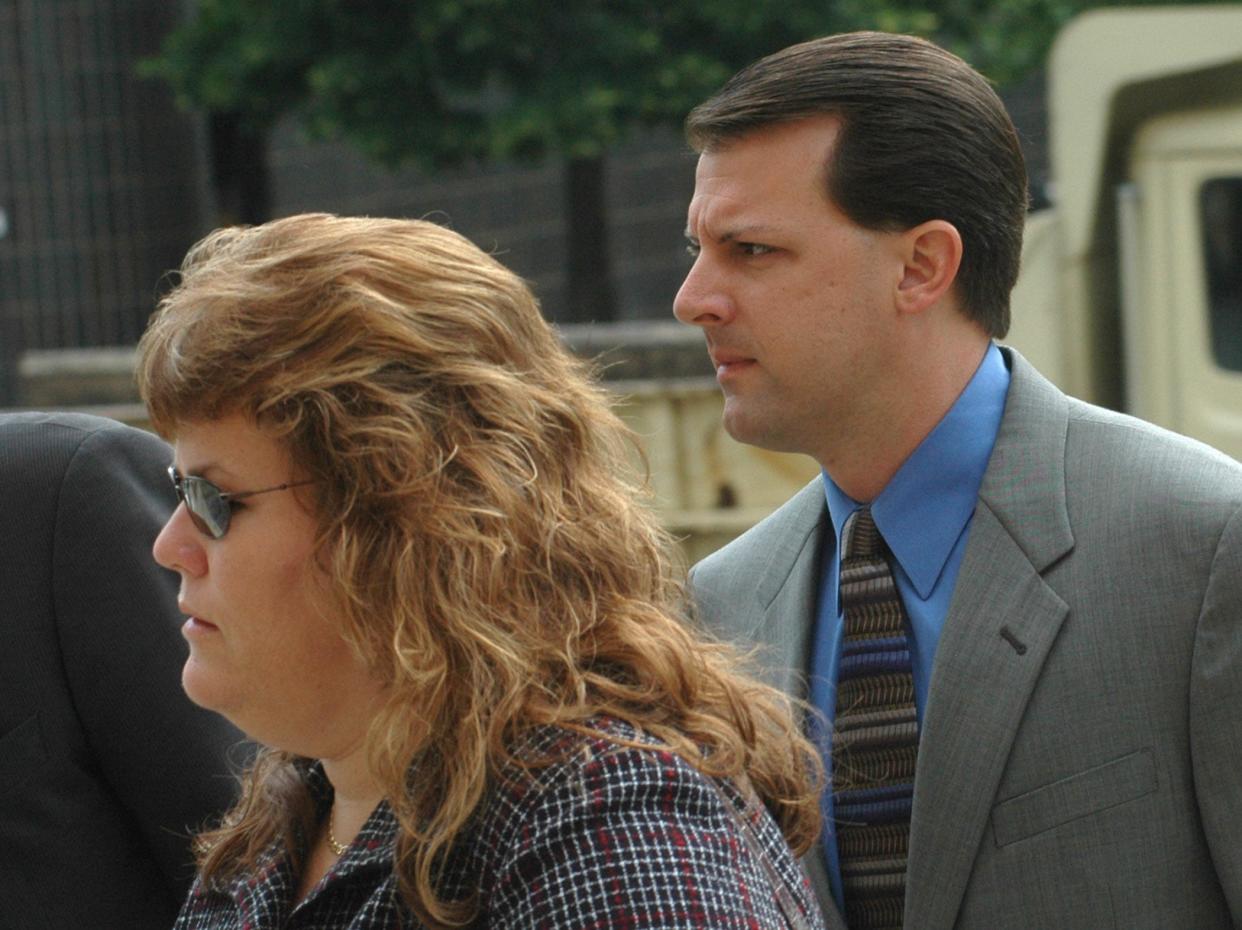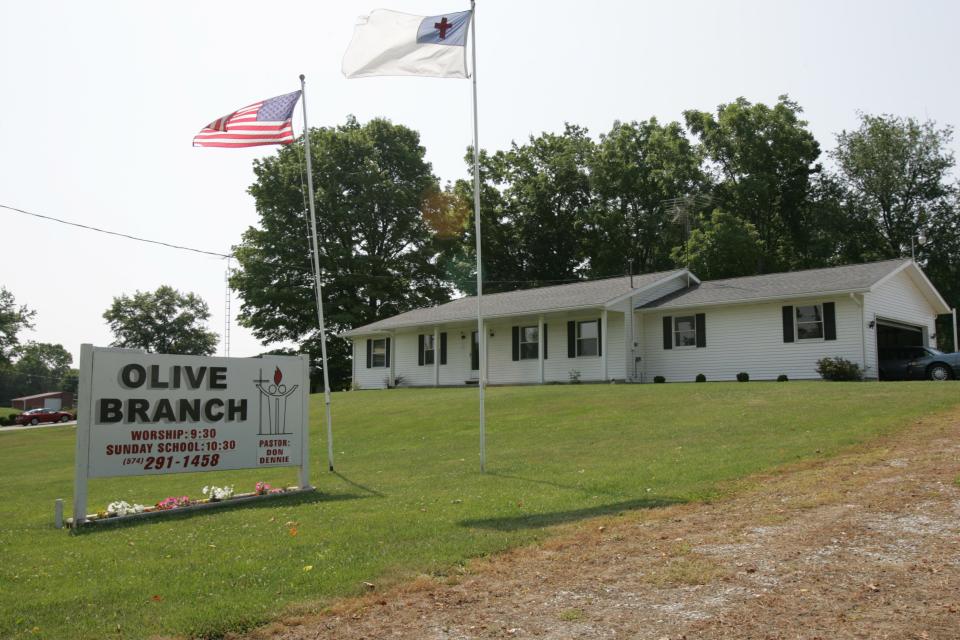True crime podcast reignites 1989 'prom night murders' as Jeff Pelley seeks new trial

When Jeff Pelley returns to South Bend in March from his Michigan City prison cell for a days-long hearing before a St. Joseph Superior judge, someone with no ties to the case will be in the courtroom watching and listening closely.
Delia D’Ambra will be there gathering material for additional episodes of "CounterClock Season 3," one of 2021’s hottest true crime podcasts.
Her podcast has reignited national interest in the case, in which the 17-year-old La Ville High School senior was convicted of fatally shooting his father Robert, stepmother Dawn and stepsisters Janel, 8, and Jolene, 6, in their Lakeville home on prom night in 1989.
The free podcast has been downloaded more than 30 million times since its April release and was named by Rolling Stone as one of the year’s 10 best true crime podcasts.
It’s not the first time that a podcaster has featured the case. San Francisco-based Esther Ludlow in May 2020 devoted two episodes of her weekly "Once Upon a Crime" podcast to it. But Ludlow only narrated a script based largely on journalist Carlton Smith’s 2009 book, "The Prom Night Murders: A Devoted American Family, Their Troubled Son, and a Ghastly Crime."
D’Ambra spent a year researching and reporting on the case, which included investigating Robert Pelley’s past in southwest Florida, shortly after quitting her job as a reporter at NBC2 in Fort Myers to focus on podcasting. She also spent time in Lakeville.
The season’s 20 episodes are rich with detailed accounts of primary source documents and include interviews with a variety of people in both states.
D’Ambra said she appreciated the Rolling Stone nod because most true crime podcasts that achieve a national following are more entertainment than journalism.

“I’m very familiar, having worked in Florida, with working with public records laws, obtaining documents and just navigating the state of Florida,” D’Ambra told The Tribune. “My familiarity with Florida, and being able to really probe into the crime and victims in light of their whole life before they were in Indiana, was really beneficial to the story and the investigation.”
D'Ambra learned about the case from an Indiana University law school student who was interning at Audiochuck Podcast Network, the Indianapolis-based firm where D’Ambra works. The school’s Wrongful Conviction Clinic has been fighting for more than a decade to get Pelley a new trial.
D'Ambra said she has communicated and compared notes with the law students and with Pelley’s attorney, Frances Watson, a faculty member at the Robert H. McKinney School of Law at IUPUI. In seeking a new trial, Watson will rely heavily on the possibility that someone from Robert Pelley’s past came to Lakeville to murder the family.
Robert Pelley had worked in information technology at a Florida bank that federal officials investigated for money laundering. He moved the family to Lakeville to become a pastor at Olive Branch United Brethren Church about a year before the killings.
“A lot of the stuff in Florida, particularly documentation and corroboration, witnesses, people that I actually interviewed on tape, some of that stuff are things that his defense team was unaware of,” D’Ambra said. “I believe they will take some of that, obviously do some of their own due diligence.”

D’Ambra said Pelley, who turned 50 this month and is serving four consecutive 40-year terms, declined her interview requests. For the podcast, she plays audio of his interviews with police.
D’Ambra told The Tribune that she came away from the project without feeling that he was guilty or innocent, but she’s certain that Pelley didn’t receive a fair trial when he was convicted in 2006.
“I do not believe the prosecution proved beyond a reasonable doubt their burden of proof,” she said.
Of the many questions about Pelley’s conviction, D’Ambra identified three that she thinks are the most significant: whether the jury was given accurate information about a pair of jeans that prosecutors said he wore when he committed the murders; the likelihood that he could have carried out the crime in the timeline laid out by prosecutors; and whether the shotgun Pelley allegedly used was in the home at the time.
The jeans and physical evidence
D’Ambra repeatedly reminds listeners that the prosecution’s case lacked any physical evidence tying Pelley to the murders.
Prosecutors argued that Pelley was angry because his father wouldn’t let him attend after-prom festivities since he had been grounded. Pelley argued that his father had relented on the punishment.
D'Ambra pokes holes in the state’s one attempt at physical evidence: the jeans he was wearing the day before he went to the prom and at the time prosecutors say he shot the victims.
At trial, police told the jury that Pelley had washed the jeans in the home’s washing machine after the shootings in an attempt to clean up himself and the scene. But she notes that her review of the case file shows no police officers reported finding the jeans in the washer, and that FBI lab results in 2006 found the jeans had no blood on them but were soiled and unwashed. Coins and a legible receipt were found in the pockets.

D’Ambra faults the defense attorney, Alan Baum, for not pointing out these facts to the jury.
“If we look back on how I handled it, I guess we would have to conclude that I didn’t make that factual connection and argument, and that I could have questioned that blue jean issue more, or let’s say better,” Baum says in one episode of the podcast. “It’s hindsight, but sometimes hindsight is 20/20. I can’t change history. That may be one of the areas I could have hit harder and didn’t.”
D’Ambra told The Tribune that it was "a critical piece of evidence that the jury got to see and was told information about."
"Is it a lynchpin in terms of guilt or innocence? I don’t really know," she said. "But I know it is something that was highly touted by the prosecution, so questioning its relevance was really important.”
A narrow timeline
Witnesses during the trial established that the victims were still alive shortly before 5 p.m. on the day of the murders.
A friend of Jeff Pelley’s said they saw him driving away from the home between 4:45 and 5 p.m. Another friend told police that he saw Pelley’s car in the home’s driveway at 5:15 p.m., although a gas station clerk told police he had seen Pelley at the station at 5:17 p.m. It was about a five-minute drive from the home to the gas station.
According to their case at trial, police believed Pelley committed the murders between 4:55 and 5:15 p.m. During that time, D’Ambra says in Episode 7, Pelley had “to shoot all four victims, pick up the shell casings, shower, change clothes, put a small load of clothes in the washing machine, pack his tuxedo, get in his car, ditch the shotgun and spent shell casings somewhere police could not find them, and then drive to the gas station.
"Investigators knew that accomplishing all of that in such a small window of time was nearly impossible but still they were convinced Jeff could have made it happen if he planned it just right.”
Was the gun in the home?
Police determined the victims were killed with a 20-gauge shotgun but never found the weapon.
D’Ambra said a question "that has always stuck with me and should be explored more” is whether Robert Pelley’s shotgun was in the home leading up to the day of the murders.
Thomas Keb, a friend of Robert Pelley’s and whose in-laws lived down the street from the church where Robert was pastor, told D’Ambra that Pelley had given him a bag containing three weapons — a rifle, a pistol and a shotgun — and asked him to keep them for a while.
Keb told the same story to Baum, Jeff’s attorney, in a deposition, and to police investigator Craig Whitfield in a 2003 affidavit.
Jeff Pelley told police that his father, about a year prior, had removed all guns from the house after Jeff tried to commit suicide with the pistol.
Keb declined to be interviewed for the podcast but told D’Ambra that he had kept the bag of guns in his in-laws’ basement.
In Episode 10, D’Ambra tells Whitfeld, “If Jeff’s guilty, then that 20-gauge wasn’t in that sack of guns, that 20-gauge is between here and the Lakeville AMCO (gas station). So, it’s just those things that get me … "
“I like your attention to detail for sure," Whitfield replies. "That’s a question that I would like to see answered.”
Neither side called Keb to testify at the trial.
Pelley sisters split on Jeff's guilt
Jessica Pelley, Dawn’s daughter from her first marriage, and Jacque Pelley, Jeff’s biological sister, did not sleep at the house the night of the murders. Jessica, 9, was away at a sleepover, while Jacque, 14, was spending the weekend at Huntington College.
Jessica, now Jessi Toronjo, thinks Jeff is guilty and told police she remembered seeing the gun still hanging in a bedroom when she left for the sleepover.
She tells D'Ambra that she knew Pelley was guilty when he wouldn't look at her during the trial.
"If you didn’t do it, you’re going to look at someone and be like, 'Dude, hey, I didn’t do it,'" she says in Episode 11. "Nope, kept his head down, didn’t look at me one time."

She elaborates on those feelings in a 2019 memoir, "I Am Jessica: A Survivor's Powerful Story of Healing and Hope," written by her cousin, Jamie Collins.
Jacque has said she couldn’t recall whether the gun was in the house before she left that weekend but noted she had no reason to look for it.
Jacque maintains a website, justiceforjeff.org, that asserts Jeff's innocence. When contacted for comment, she asked that The Tribune not publish her last name or identify where she’s living now.
But she praised the podcast.
“Delia's work is a great representation of the facts and the hard work that Fran and her students have put in over the years,” Jacque said. “We never wanted to lead Delia in any certain direction. We wanted to let her do her own research to see if she came up with the same stuff that we did, or possibly more than we did. We wanted her to follow it wherever it took her.”
This article originally appeared on South Bend Tribune: Prom night murders: CounterClock podcast questions Jeff Pelley's guilt

